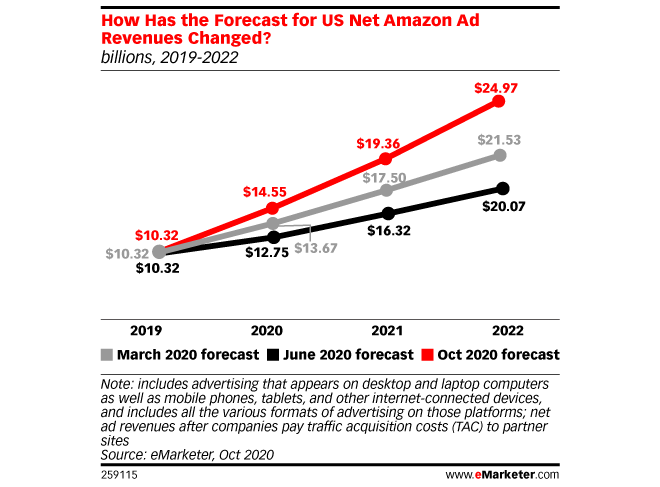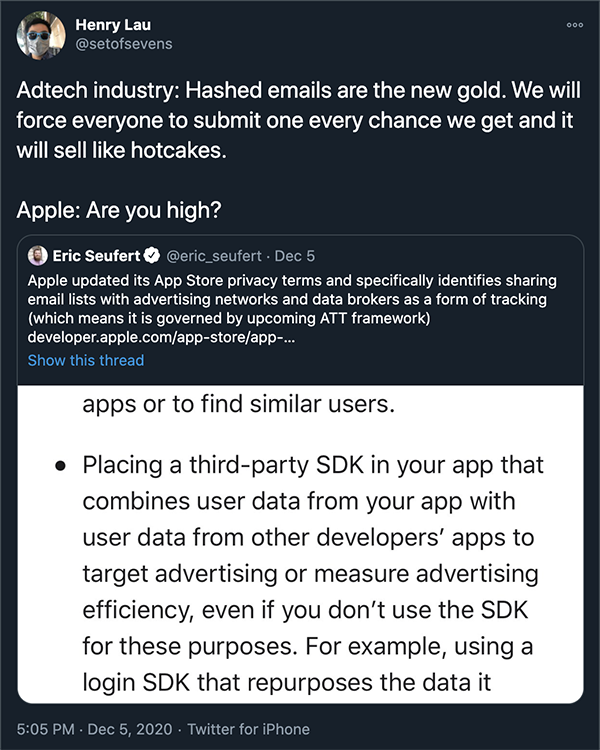 |
||||||||||
|
||||||||||
| Amazon’s 2019 Ad Spend Spree Is Still Paying Off |

Image sourced from eMarketer
|
| The old adage: “You have to spend money to make money,” couldn’t have worked out any better for Amazon this year. In 2019, the ecommerce giant’s advertising and promotion spending surged 34% to $11b, as net sales swelled 20% to $281b earning it the title of Ad Age’s World’s Largest Advertiser. Although the retailer cut spending due to the pandemic this year, it hasn’t hugely impacted sales. Amazon’s ad business is also faring exceptionally well, with eMarketer recently updating their projections for ad revenue from $14b in June to $15b. |
| As COVID-19 shifted consumer shopping habits to mostly online, the ecommerce giant realized the benefits of marketers’ following shoppers to advertise their wares on the platform. Since consumers are already in a shopping frame of mind, advertisers are looking to leverage the performance they can get from the high level of purchase intent. For the past couple of years, we’ve been talking about Amazon’s massive assault on the duopoly, as they build out a competitive advertising marketplace. And while it’s still a far cry from Google’s (um, Alphabet’s) massive ad share, Amazon has been on a continuous growth trajectory in ad sales, from $1b to $15b the past four years, steadily cutting into the big G’s search business. With the US Department of Justice's growing concerns about Google’s search dominance, there could be far greater room for Amazon to claim an even larger piece of the product search pie. |
| Google Begins Ad Block Attack |
| I hope you guys didn’t think Google was kidding around back in May when they announced leveraging their browser dominance to set the standard for what constitutes a resource-heavy ad. Basically, starting with Chrome 84, resource-intensive ads are being blocked to improve user experience and limit the opportunity for bad ads to wreak havoc on their computers. Well, there’s finally a public example of how this all works out in the wild. Joshua Benton at NiemanLab was recently alerted that someone spotted a Google-blocked ad on the homepage of The New York Times. The New York Times? Yep, that’s right. |
| In his write up, Benton splendidly lays out an argument against Google being both judge and jury with regard to which ads should be able to display in a user's browser. He wonders: “I still can’t quite get over the idea that Google — the world’s largest advertising company, perennially investigated by regulators for its abuse of its market power, criticized for its negative impacts on the news industry — gets to decide, unilaterally, that an ad The New York Times sold can’t be shown to a New York Times reader.” Sure, it makes sense not to hamper a user's experience with slow-loading ads. They deserve better in exchange for their trust. And we, like Benton, are quite certain the Times has its own set of standards, especially for the homepage, that wouldn’t take advantage of that trust. Plus, the Times has a deal with an advertiser to serve a certain amount of impressions. And there’s no way they can fulfill their end of the agreement or get paid if the ad isn’t being viewed. How can pubs sell against this ad-block filter in Chrome? The filter is determining resource allocation in Chrome algorithmically and is therefore susceptible to making conclusions based on unreliable factors. For instance, a user could have way too many tabs open. Or perhaps they've added one too many resource-intensive extensions. Hopefully, once more pubs run into this brick wall (and we hope not), they can raise their voices in powerful unison towards finding a better solution. One that works to the advantage of everyone involved—users, pubs, and advertisers. |
 |
| No, Hashed Emails Will Not Take IDFA's Place |

Image sourced from Twitter
|
| Mobile app pubs just can’t catch a break. With IDFA becoming opt-in only, many pubs had high hopes that email addresses, or maybe even phone numbers, could serve as a replacement identifier. But mobile analyst Eric Seufert warns that once Apple’s App Tracking Transparency (ATT) framework goes live in 2021, pubs must receive explicit approval from users to use their email addresses for a) retargeting them with ads or b) creating lookalike audiences. We don’t think Apple could make it any plainer than this: Any data collected from users will be subject to ATT guidelines, whether it happens in-app or outside of the app. And pubs will be responsible for the data collection and tracking practices of third-party partners as well. |
| Apple is holding all of the keys to identity on mobile. Failure to comply with ATT, once it goes into effect could result in delayed app approval or worse yet, app removal. Compliance with ATT could even impact ID solutions based on email hashing to track users across devices and browsers. Sure pubs could try to find workarounds or loopholes, but who’s gonna want to take the chance? It’s not that Apple is omniscient, but what publisher will want to ruffle any feathers. We’re not implying that access to audiences will no longer exist, it’s just that pubs shouldn’t expect to have the kind of scale that they do today. It’s a new world order on our doorsteps knocking and it’s going to take new tools that can ensure a user’s privacy while also allowing pubs to monetize app downloads and usage. |
| @{optoutfooterhtml}@ |








